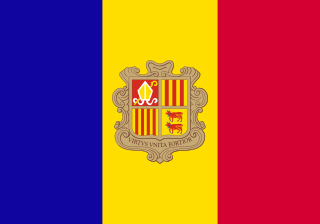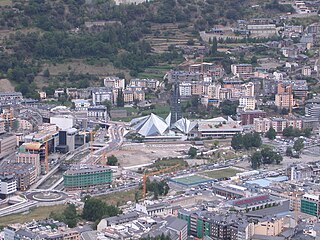The Cultural Heritage of Andorra is an organization in Andorra which protects national buildings and monuments considered of cultural and historical value.
The Cultural Heritage of Andorra is an organization in Andorra which protects national buildings and monuments considered of cultural and historical value.

Andorra, officially the Principality of Andorra, is a sovereign landlocked country on the Iberian Peninsula, in the eastern Pyrenees, bordered by France to the north and Spain to the south. Believed to have been created by Charlemagne, Andorra was ruled by the count of Urgell until 988, when it was transferred to the Roman Catholic Diocese of Urgell. The present principality was formed by a charter in 1278. It is currently headed by two co-princes: the bishop of Urgell in Spain and the president of France. Its capital and largest city is Andorra la Vella.

Andorra is a small, landlocked country in southwestern Europe, located in the eastern Pyrenees mountain range and bordered by Spain and France. With an area of 468 km², it is the sixth smallest country in Europe and also the largest of the European microstates.

Andorra la Vella is the capital and largest city of Andorra. It is located high in the east Pyrenees, between France and Spain. It is also the name of the parish that surrounds the capital.

La Massana is one of the seven parishes of the Principality of Andorra. It is located in the northwest of the country. La Massana is also the name of the main town of the parish. The name Massana derives from the Latin name mattianam for a variety of apple. Other settlements in the parish are Pal, Arinsal, Erts, Sispony, Anyós, L'Aldosa de la Massana, Puiol del Pui, Escàs, Els Plans, Mas de Ribafeta, Xixerella and Pui.

Canillo is one of the parishes of Andorra. Canillo is also the name of the main town of the parish. The parish is considered the religious center of Andorra with the Sanctuary and Chapel of Our Lady of Meritxell, patron saint of Andorra, and contains one of the best-preserved romanesque churches in the Pyrenees, Sant Joan de Caselles. It has a population of 4,826, as of 2011. Despite having a tourist vocation, the parish of Canillo still retains many livestock and agricultural traits. It borders France.

Escaldes–Engordany is one of the seven parishes of Andorra. The Escaldes–Engordany parish was founded on 14 June 1978 and has the second largest population after Andorra la Vella. The parish is composed of the areas les Escaldes, Engordany, Els Vilars d'Engordany, Engolasters, and El Fener. As of 2014 it has a population of 13,634. Notable events include the town's annual jazz festival. It borders four parishes: Encamp to the north and northeast, Sant Julià de Lòria in the southwest, Andorra la Vella in the west, and La Massana in the northwest. Escaldes–Engordany also borders Spain in the east, south and southeast.

Ordino is the most northerly parish in the Principality of Andorra. It's mostly the main area of Valira del Nord or Valira d'Ordino river valley. Ordino is also the name of the main town of the parish. Other settlements in the parish are El Serrat, Ansalonga, Sornàs, La Cortinada, Llorts, Segudet, Arans, Les Salines and Arcalís. It is home to the Sorteny National Park, the largest nature area of Andorra. It has a population of 4,858, as of 2017. The town preserves a vast medieval center, mainly linked to the culture of the country.

The following outline is provided as an overview of and topical guide to Andorra:

Torà is a town and municipality in the North East of the comarca (county) of Solsonès, in the province of Lleida, Catalonia, Spain. The urban structure of the center has retained most of its original design, with narrow, twisting streets and blocks formed by rows of attached buildings. The Medieval town grew around a castle or fortified place. A particular trait of the fortified origin of the town is the presence of a number of portals to allow several streets their pass through defensive barriers formed by the rows of buildings of the town and its walls. Torà is some 10 kilometers northeast from the more populated Guissona, a neighbor town that has experienced an important economic development in the last half century parallel to an unprecedented demographic growth sped up in the recent years.
Listed below are articles about or related to Andorra, arranged alphabetically:

Església de Sant Miquel d'Engolasters is a church located in Engolasters, Escaldes-Engordany Parish, Andorra. It is a heritage property registered in the Cultural Heritage of Andorra. It was built originally in the 11-12th century.

Església de Sant Pere Màrtir, Escaldes-Engordany is a church located in Escaldes-Engordany, Andorra. It is a heritage property registered in the Cultural Heritage of Andorra. It was built in 1956–1981.

Església de Sant Romà dels Vilars is a church located in Els Vilars, Escaldes-Engordany Parish, Andorra. It is a heritage property registered in the Cultural Heritage of Andorra. It was built in the 10th century.

The 1983 Andorran local elections were held on 12 December. Voters elected the council members of the seven parishes of Andorra. For first time since 1867, local elections were not hold on the same day as parliamentary elections. This was also the first time that the totality of the council seats were up for election.

The 1987 Andorran local elections were held on 13 and 20 December. Voters elected the council members of the seven parishes of Andorra. Following the election, the communal councils elected the mayors and deputy mayors.
The 1991 Andorran local elections were held on 15 and 22 December. Voters elected the council members of the seven parishes of Andorra. Following the election, the communal councils elected the mayors and deputy mayors.
The Principality of Andorra's honours system started developing very recently and it is still in development.
The 2019 Andorran local elections were held on 15 December, to elect all councillors in the seven parishes of Andorra.